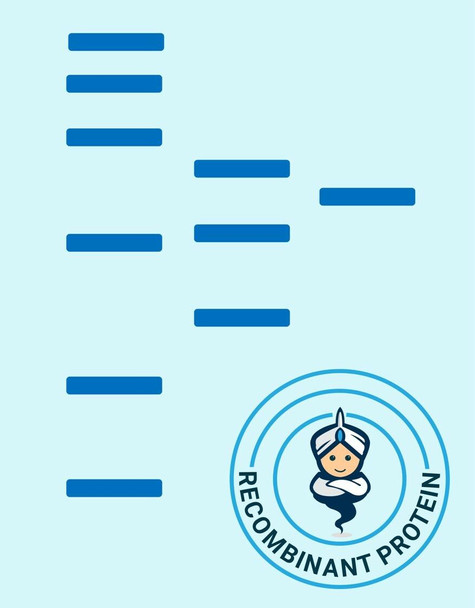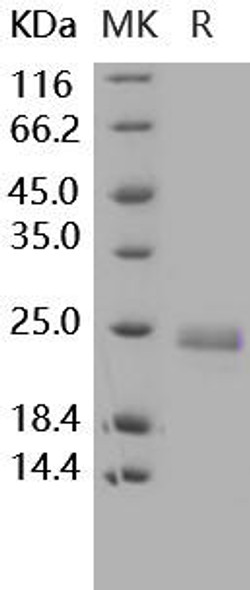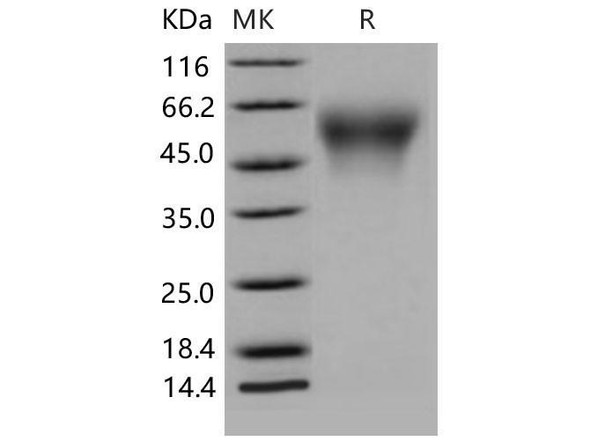Mouse TNFSF14 Recombinant Protein (RPPB1036)
- SKU:
- RPPB1036
- Product Type:
- Recombinant Protein
- Species:
- Mouse
- Uniprot:
- Q9QYH9
- Research Area:
- Cytokines
Description
| Product Name: | Mouse TNFSF14 Recombinant Protein |
| Product Code: | RPPB1036 |
| Size: | 20µg |
| Species: | Mouse |
| Target: | TNFSF14 |
| Synonyms: | Tumor necrosis factor ligand superfamily member 14, CD258, Tnfsf14, Light. |
| Source: | Escherichia Coli |
| Physical Appearance: | Sterile Filtered White lyophilized (freeze-dried) powder. |
| Formulation: | TNFSF14 protein was lyophilized from a 0.2�m filtered concentrated solution in PBS pH7.4. |
| Solubility: | It is recommended to reconstitute the lyophilized TNFSF14 in sterile 100mM HAc not less than 100�g/ml, which can then be further diluted to other aqueous solutions. |
| Stability: | Lyophilized TNFSF14 although stable at room temperature for 3 weeks, should be stored desiccated below -18°C. Upon reconstitution TNFSF14 should be stored at 4°C between 2-7 days and for future use below -18°C. For long term storage it is recommended to add a carrier protein (0.1% HSA or BSA). Please prevent freeze-thaw cycles. |
| Purity: | Greater than 96.0% as determined by:�(a) Analysis by RP-HPLC.(b) Analysis by SDS-PAGE. |
| Amino Acid Sequence: | DGGKGSWEKL IQDQRSHQAN PAAHLTGANA SLIGIGGPLL WETRLGLAFL RGLTYHDGAL VTMEPGYYYV YSKVQLSGVG CPQGLANGLP ITHGLYKRTS RYPKELELLV SRRSPCGRAN SSRVWWDSSF LGGVVHLEAG EEVVVRVPGN RLVRPRDGTR SYFGAFMV |
| Biological Activity: | The ED50 as determined by a cytotoxicity assay using human HT-29 cells is less than 2�g/ml, corresponding to a specific activity of > 500 IU/mg in the presence of murine anti-polyHistidine monoclonal antibody and rHuIFN-g. |
TNFRSF14, a member of the TNF receptor superfamily, is a type I transmembrane protein. TNFRSF14 is expressed in peripheral blood T cells, B cells, monocytes and in various tissues enriched in lymphoid cells. TNFRSF14 operates as a co-stimulatory factor for the activation of lymphoid cells and as a deterrent to infection by herpesvirus. Additionally, TNFRSF14 encourages the proliferation of T cells, and triggers apoptosis of various tumor cells.�
TNFSF14 Mouse Recombinant produced in E. Coli is a single, non-glycosylated, polypeptide chain containing 168 amino acids and having a molecular mass of 18.4kDa.
| UniProt Protein Function: | TNFSF14: Cytokine that binds to TNFRSF3/LTBR. Binding to the decoy receptor TNFRSF6B modulates its effects. Activates NFKB, stimulates the proliferation of T-cells, and inhibits growth of the adenocarcinoma HT-29. Acts as a receptor for Herpes simplex virus. Belongs to the tumor necrosis factor family. 2 isoforms of the human protein are produced by alternative splicing. |
| UniProt Protein Details: | Protein type:Cytokine; Membrane protein, integral; Inhibitor Cellular Component: extracellular space; membrane; plasma membrane; extracellular region; integral to membrane Molecular Function:caspase inhibitor activity; cytokine activity; tumor necrosis factor receptor binding; receptor binding Biological Process: release of cytoplasmic sequestered NF-kappaB; T cell costimulation; immune response; negative regulation of caspase activity; positive regulation of myoblast differentiation |
| UniProt Code: | Q9QYH9 |
| NCBI GenInfo Identifier: | 21363042 |
| NCBI Gene ID: | 50930 |
| NCBI Accession: | Q9QYH9.1 |
| UniProt Secondary Accession: | Q9QYH9,Q059Y9, |
| UniProt Related Accession: | Q9QYH9 |
| Molecular Weight: | 26,338 Da |
| NCBI Full Name: | Tumor necrosis factor ligand superfamily member 14 |
| NCBI Synonym Full Names: | tumor necrosis factor (ligand) superfamily, member 14 |
| NCBI Official Symbol: | Tnfsf14�� |
| NCBI Official Synonym Symbols: | LTg; HVEML; LIGHT; Ly113; HVEM-L�� |
| NCBI Protein Information: | tumor necrosis factor ligand superfamily member 14 |
| UniProt Protein Name: | Tumor necrosis factor ligand superfamily member 14 |
| UniProt Synonym Protein Names: | CD_antigen: CD258Cleaved into the following 2 chains:Tumor necrosis factor ligand superfamily member 14, membrane form; Tumor necrosis factor ligand superfamily member 14, soluble form |
| Protein Family: | Light-induced protein |
| UniProt Gene Name: | Tnfsf14�� |
| UniProt Entry Name: | TNF14_MOUSE |









